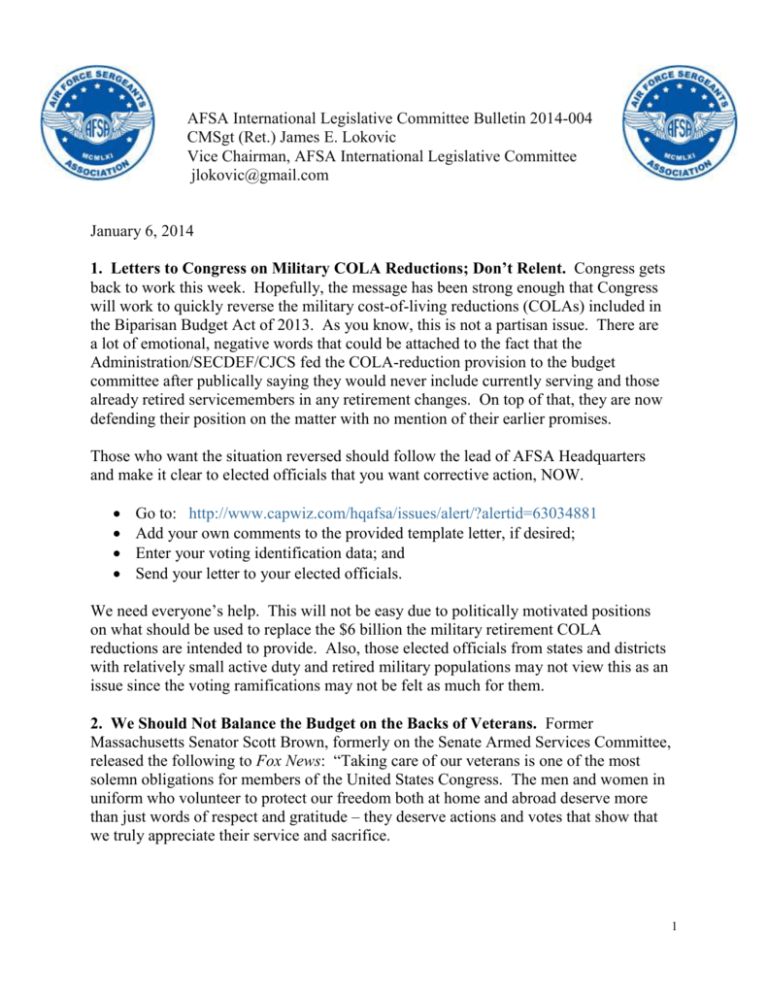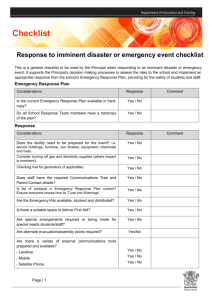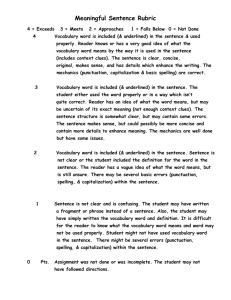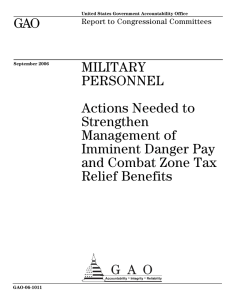AFSA International Legislative Committee Bulletin 2014
advertisement

AFSA International Legislative Committee Bulletin 2014-004 CMSgt (Ret.) James E. Lokovic Vice Chairman, AFSA International Legislative Committee jlokovic@gmail.com January 6, 2014 1. Letters to Congress on Military COLA Reductions; Don’t Relent. Congress gets back to work this week. Hopefully, the message has been strong enough that Congress will work to quickly reverse the military cost-of-living reductions (COLAs) included in the Biparisan Budget Act of 2013. As you know, this is not a partisan issue. There are a lot of emotional, negative words that could be attached to the fact that the Administration/SECDEF/CJCS fed the COLA-reduction provision to the budget committee after publically saying they would never include currently serving and those already retired servicemembers in any retirement changes. On top of that, they are now defending their position on the matter with no mention of their earlier promises. Those who want the situation reversed should follow the lead of AFSA Headquarters and make it clear to elected officials that you want corrective action, NOW. Go to: http://www.capwiz.com/hqafsa/issues/alert/?alertid=63034881 Add your own comments to the provided template letter, if desired; Enter your voting identification data; and Send your letter to your elected officials. We need everyone’s help. This will not be easy due to politically motivated positions on what should be used to replace the $6 billion the military retirement COLA reductions are intended to provide. Also, those elected officials from states and districts with relatively small active duty and retired military populations may not view this as an issue since the voting ramifications may not be felt as much for them. 2. We Should Not Balance the Budget on the Backs of Veterans. Former Massachusetts Senator Scott Brown, formerly on the Senate Armed Services Committee, released the following to Fox News: “Taking care of our veterans is one of the most solemn obligations for members of the United States Congress. The men and women in uniform who volunteer to protect our freedom both at home and abroad deserve more than just words of respect and gratitude – they deserve actions and votes that show that we truly appreciate their service and sacrifice. 1 “That’s why the recent budget deal that cuts military retiree benefits by $6 billion dollars is completely unacceptable. “Both parties should work together to undo this mistake immediately when Congress returns to work in the New Year, but let’s be clear: these cuts to veterans’ benefits were a serious mistake that never should have happened.” To read the rest of Senator Brown’s statement, go to: http://www.foxnews.com/opinion/2014/01/06/it-wrong-to-balance-nation-books-onbacks-our-veterans/ 3. Finding Money to Reverse Military Pension Cuts. A Washington Times article reports, “All sides say they want to undo the cuts to military retirement benefits approved by Congress in last month’s budget deal — but finding the money to pay for it is proving to be a major problem. “Democrats suggest closing the tax breaks that companies get for income earned outside the U.S., while GOP lawmakers have proposed everything from scaling back U.S. Postal Service deliveries to cutting benefits that go to illegal immigrant parents. “With each side resisting the other’s plans, the military retirement benefit fight joins unemployment insurance and a looming debt-limit increase as indications that the spending battles of the last three years aren’t going away.” Note: Again, for that reason, it is important that AFSA members, their family members, survivors, their colleagues and friends communicate with elected officials now to urge that this situation be fixed. To read the full Washington Times article, go to: http://www.washingtontimes.com/news/2014/jan/5/finding-money-to-reverse-militarypension-cuts-is-/ 4. Changes to Imminent Danger Pay. A recent DoD news release says, “The Defense Department announced today changes in imminent danger pay that will go into effect June 1, DOD spokesman Army Col. Steven Warren told reporters here. ‘This is a process that began [in 2011],’ he said, and ‘included in-depth threat assessment from the combatant commands. It was made in coordination with the Joint Staff, combatant commands and military services.’ Warren noted that this policy change was not a budget-driven decision, but part of a routine recertification that ‘happens every couple of years -- it’s an ongoing process.’ 2 “According to a DOD news release announcing the recertification, the combatant commands conducted in-depth threat assessments for countries within their areas of responsibility. Following the review, the release stated, it was determined that the imminent threat of physical harm to U.S. military personnel due to civil insurrection, civil war, terrorism or wartime conditions is significantly reduced in many countries, resulting in the discontinuation of imminent danger pay in those areas. “Periodic recertification of IDP, according to the news release, ensures that imminent danger designations match the actual conditions of designated countries so that the department can provide fair entitlements and benefits. The last recertification was completed in 2007. “The DOD news release noted the following areas would no longer be designated as imminent danger areas for IDP purposes: • The nine land areas of East Timor, Haiti, Liberia, Oman, Rwanda, Tajikistan, United Arab Emirates, Kyrgyzstan and Uzbekistan. • The six land areas and airspace above Bahrain, Kuwait, Qatar, Saudi Arabia, Serbia and Montenegro. • The four water areas of the Arabian Sea, Gulf of Aden, Gulf of Oman, and the Red Sea. • The water area and air space above the Persian Gulf. “Of specific note,” Warren said, “imminent danger pay will remain in effect for the following: Iraq, Afghanistan, Lebanon, Jordan, Pakistan, Syria, Yemen and Egypt.” Although 2013 statistics are not currently available, Warren noted the year prior, 194,189 personnel received imminent danger pay. “‘Approximately 50,000 less will be receiving imminent danger pay. . . In [2012], we spent approximately $500 million on imminent danger pay. This [IDP location reduction] will result in a reduction of approximately $100 million.’ “The benefit provides troops in imminent danger areas about $7.50 per day up to the maximum monthly rate of $225, Warren said.” Full article: http://www.defense.gov/news/newsarticle.aspx?id=121426 5. Air Force Enlisted Force Reduction Plans. US Air Force news release: “A quality force review board will convene here May 5-16 to consider eligible Airmen for retention, Air Force Personnel Center officials announced recently. “The board is one of several fiscal 2014 force management programs that have been or will be implemented to help achieve manpower and force structure goals as the service focuses on 2015 and beyond, said Lt. Col. Rick Garcia, the AFPC retirements and separations branch chief. 3 “The board will consider Airmen with fewer than 18 years, or with 20 years or more of service as of Sept. 30, 2014, who have specific negative reporting identifiers, reenlistment eligibility codes, assignment availability codes or grade status reasons. “Those identifiers, indicators, codes and reasons include awaiting retraining due to disqualification, awaiting discharge for cause, current referral performance report, grade reduction, rank not commensurate with years of service, five or more days lost time, career field skill level not commensurate with grade, serving a suspended Article 15 punishment, serving on control roster, poor fitness assessment, disqualified Airmen (for cause) returned to duty program and denied reenlistment. “Airmen who have 20 or more years of active service who are not selected for retention must retire by Oct. 1, 2014.” To read more, go to: http://www.af.mil/News/ArticleDisplay/tabid/223/Article/467855/enlisted-quality-forcereview-board-to-be-held-in-may.aspx (end) 4








